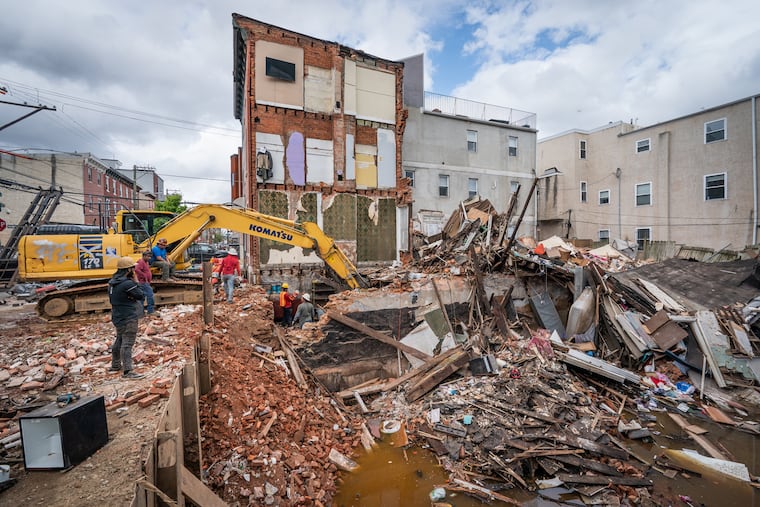A Philly family’s home was destroyed by contractors with a record of causing damage and collapses
Tyrone Mack, who has stage four colon cancer, was on his way home from treatment when he learned his home was damaged beyond repair.

When Sandy Island rushed her three school-age kids out of their lifelong home on Tuesday, they didn’t know it would be for the last time.
“My family was already struggling as is,” she said. Her husband, Tyrone Mack, has Stage 4 colon cancer, her son Tyreek has leukemia, and daughter Mac-kyah, at age 11, has had three open-heart surgeries. “And then they came here and hit the side of my home with their crane.”
A developer called the Regis Group had been building a 10-unit apartment complex on the two-parcel lot next door in the Francisville neighborhood, and Island said it had been causing damage to her rowhouse for months, requiring installation of star bolts to secure it. Then, the impact on Tuesday caused a partial collapse.
Island was struggling with the front door, which was stuck, when she heard a scream from behind her. “The kitchen [ceiling] fell on my kids,” she said. They were terrified but unharmed.
City records show that Dornelas Construction was the excavator.
Dornelas is one of just a handful of companies licensed by the city of Philadelphia for dangerous, high-risk excavation work. It also has a long history of undermining or destroying neighboring homes and putting workers in danger, a 2023 Inquirer investigation found.
The city — despite issuing Dornelas 17 violations in two years, and suspending the license of an alter-ego company, Freedom Construction — has not revoked Dornelas’ license.
Public records show no indication that inspectors provided oversight of that excavation work; two scheduled inspections, for March and April, are listed as canceled.
Mack learned of the destruction on his way home from cancer treatment, according to Legacy of Hope, a nonprofit collecting donations to support the family. Island said he was in physical pain, and both were like “zombies” from lack of sleep.
“We’re here, but we’re not here,” she said.
Michael Rowe, the nonprofit’s chief executive, said that “the contractors involved have provided no help thus far, and already walked back their offer to put the family in a hotel or residence for the night.”
Dornelas did not return calls. Calls to the Regis Group went unanswered. And James Clancy, listed as the design professional in charge, did not respond to a message left Thursday.
Understaffed, budget unchanged
The collapse came less than 24 hours after the Department of Licenses and Inspections (L&I) presented a flat-funded budget proposal from Mayor Cherelle L. Parker — who had pledged to step up enforcement and rein in a culture of impunity among contractors. In response to The Inquirer’s investigation and a city task force’s recommendations, she split L&I into two departments, one of which is to focus exclusively on building safety.
But Parker failed to act on another task force recommendation — that L&I retain a greater percentage of the $87 million in annual revenue it generates, to address severe staffing shortfalls. Instead, the Parker administration has proposed to keep the department’s funding unchanged, even as its two new leaders pledged to roll out a slew of additional programs, including proactive rental-unit inspections, which would be a first for Philadelphia.
The budget presentation revealed staffing is at 75% and building inspectors are facing workloads near all-time highs — responsible for 989 permits each, on average.
Representatives of the city and L&I did not respond to requests for comment.
Dornelas Construction’s history with the city goes back to 2021, when it obtained a license just as Freedom Construction was facing a suspension from the city for “repeated violations related to excavation, shoring and underpinning that risked public safety.” The federal Occupational Safety and Health Administration (OSHA) also lists Freedom as a severe violator for exposing workers to danger of cave-ins at six excavation sites.
Excavations are the city’s leading cause of construction damage and collapses, because work can destabilize the foundations of the city’s century-old rowhouses, which are built atop rough rubble stone held together with little or no mortar.
In a 2023 deposition, co-owner Ronildo Dornelas testified about a different Dornelas project that caused a building to be structurally compromised. He said he realized that the engineer’s plans were flawed; they called for compacting wet soil that would cause enough vibration to potentially destabilize a neighboring structure. But, under pressure from the contractor and engineer, he said, he went ahead with it. “As soon as … the compactor started to be used, the house broke,” he testified.
The Inquirer’s investigation found that at least 50 occupied rowhouses across the city each year are rendered unsafe during construction next door, and that city and state regulators had failed to discipline contractors, architects or engineers who caused repeated damage.
In February, New Salem Baptist Church — which has been a fixture in North Philadelphia for 90 years — was deemed unsafe after cracks spread across its walls and floors during excavation on an adjacent property.
“They have destroyed our church home,” said Catherine Autrey, a church member. “Our church has gaping holes in the wall. From the top we have cracks all the way to the floor. The floor is separated from the wall. This is heartbreaking, because now we don’t even have a place to worship.”
She and other church members said it took days of calling L&I and holding rallies to get any city attention. Two months later, their church is still listed as unsafe.
“If they don’t respect God’s house, if they can do it to his house,” church member Sheila Briggman said, “they can do it to anybody’s house.”